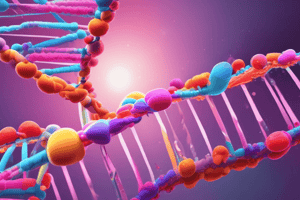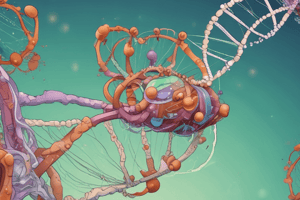Podcast
Questions and Answers
कौन सा संदर्भ गिरी के लिए है?
कौन सा संदर्भ गिरी के लिए है?
- जीनेटिक विविधता (correct)
- रसायनिक प्रक्रिया
- ऊर्जा उत्पादन
- प्रीटीन संश्लेषण
किस प्रक्रिया में राइबोसोम जेनेटिक कोड को पढ़ता है और प्रोटीन्स का संश्लेषण करता है?
किस प्रक्रिया में राइबोसोम जेनेटिक कोड को पढ़ता है और प्रोटीन्स का संश्लेषण करता है?
- ऊर्जा उत्पादन
- रसायनिक प्रक्रिया
- जीनेटिक विविधता
- प्रोटीन संश्लेषण (correct)
कौन सी प्रक्रिया शोधकों के फैलाव को समझाने में मदद करने के लिए विश्लेषित प्रारूप में होती है?
कौन सी प्रक्रिया शोधकों के फैलाव को समझाने में मदद करने के लिए विश्लेषित प्रारूप में होती है?
- प्रीटीन संश्लेषण (correct)
- प्रोटीन संश्लेषण
- पुर्नलेख
- परिणाम
किस उपकरण ने हमारी क्षमता को संपादित करने में क्रांति ला दी है?
किस उपकरण ने हमारी क्षमता को संपादित करने में क्रांति ला दी है?
किस प्रक्रिया में RNA मॉल्युल्स प्रोटीन्स के संश्लेषण के लिए धारक के रूप में कार्य करते हैं?
किस प्रक्रिया में RNA मॉल्युल्स प्रोटीन्स के संश्लेषण के लिए धारक के रूप में कार्य करते हैं?
Flashcards are hidden until you start studying
Study Notes
Unlocking Genetics: An Exploration of Biology's Building Blocks
Genetics, the study of heredity and the variation of organisms, is a captivating cornerstone of biology. This field provides insights into the fundamental mechanisms that underpin life itself and has revolutionized our understanding of evolution, disease, and technology.
To delve into the world of genetics, we must first grasp its core components and the standard format for communicating genetic research.
DNA: The Genetic Alphabet
Genetic information is encoded within DNA (deoxyribonucleic acid), a double helix structure consisting of four nucleotides: adenine (A), cytosine (C), guanine (G), and thymine (T). These nucleotides pair up in specific ways, forming the base pairs A-T and G-C.
Genes: The Building Blocks of Heredity
Genes are segments of DNA that encode proteins or regulate the expression of other genes. They are the fundamental units of heredity, and their locations within the DNA molecule are identified using specific nomenclature, such as chromosomes and positions within those chromosomes.
Cellular Processes: DNA Replication and Transcription
To pass genetic information from one generation to the next, cells must replicate their DNA. This process, called DNA replication, creates two identical copies of the DNA molecule. Subsequently, the genetic information within the DNA is transcribed into RNA (ribonucleic acid) molecules by a process called transcription.
Protein Synthesis: From RNA to Protein
RNA molecules serve as templates for the synthesis of proteins. The process of protein synthesis, or translation, occurs in the cellular structure called the ribosome. The ribosome reads the genetic code in the RNA molecules and synthesizes amino acids into proteins, which are the building blocks of cells and the foundation of life.
Genetic Variation and Evolution
Genetic variation, or differences in DNA sequences, occur in populations. This variation fuels the process of natural selection, which is the driving force behind evolution. By studying genetic variation, scientists can make predictions about the future of species, including their adaptability and potential for survival.
Genetics in Research
Genetic research often follows a standardized format, which includes an abstract, introduction, methods, results, discussion, and references. Researchers also use visual aids to help convey their findings, including tables, figures, and graphs.
The Future of Genetics
Genetics continues to impact various fields, including medicine, agriculture, and technology. The discovery of CRISPR/Cas9, a gene-editing tool, has revolutionized our ability to manipulate the genetic code. This technology has the potential to cure diseases, improve crop yields, and address global challenges in the coming years.
Regardless of the field of biology you choose to explore, genetics will likely be an essential component of your understanding. By delving into the topics covered in this article, you have taken the first step towards unlocking the secrets of this fascinating field.
Studying That Suits You
Use AI to generate personalized quizzes and flashcards to suit your learning preferences.




